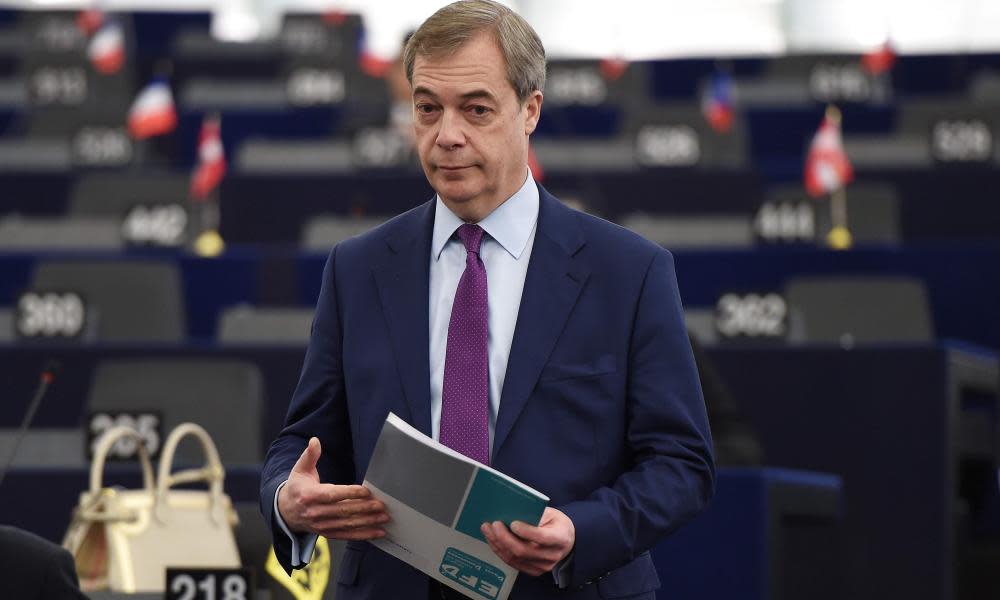Ukip faces 'reform or die' moment, warns Nigel Farage

Ukip faces a “reform or die” moment, Nigel Farage has warned, as insiders say the party is losing up to 1,000 paying members a month amid the continuing chaos over Henry Bolton’s future, placing severe strain on its finances.
Farage stopped short of explicitly backing the beleaguered Bolton in his efforts to remain leader and reform Ukip’s internal structures on Tuesday but argued that it was a long overdue fight.
Farage said he supported Bolton’s plan to change Ukip’s constitution to curb the role of the powerful national executive committee (NEC) as the party’s ultimate decision maker.
“That is exactly what I and all the other previous leaders of the party want,” Farage told Sky News. “In my last two years of leading that party I was unable to do any of the things I wanted. I was outvoted by a group of volunteers, who frankly had no political experience at all.”
This was a last opportunity for change, Farage said. “Simply, it’s reform or die. If it goes on being run by a group of amateurs, within 18 months it will be worthless,” he said.
Bolton has his own reason for wanting to rein in the NEC, after its members overwhelmingly passed a no-confidence vote against him on Sunday. But he is far from alone in seeking to reform a body many in Ukip believe is a roadblock to change.
One senior Ukip figure, with many years of experience in the party – which topped the vote in the 2014 European elections and won the third-biggest total in 2015’s general election – said the NEC had a long history of delaying or watering down necessary changes, meaning little was actually done.
“The NEC is very good at stopping the leader doing what they want, but it’s not very good at being proactive,” he said. “So it doesn’t really achieve very much. It’s good at throwing spanners in the works, but not very good at managing things.”
Battling with the NEC was one of the reasons Farage stepped down as Ukip leader in mid-2016, and since then the increasingly dysfunctional party has seen three more permanent leaders and two interim ones, and is likely to soon seek a successor to Bolton.
Farage’s successor, Diane James, who won her leadership election on a platform of internal party reform, stepped down after 18 days saying she did not have “sufficient authority” to push through the changes. She was followed by Paul Nuttall, who stepped down after Ukip’s disappointing performance in last year’s general election.
While the NEC is elected by party members, as Farage noted the last vote saw 93 candidates vying for six vacancies, making the result something of a lottery.
Its 14 current members, who are unpaid, include senior figures such as Bolton, and the party chairman and general secretary, but also a number of little-known activists with no experience beyond local politics.
Bolton’s defiance of the NEC means ordinary party members will gather for an emergency meeting next month, which is expected to see him finally ejected and an interim leader picked. Yet another leadership contest would then begin – potentially leaving the party rudderless up to the local elections in May.
A consequence of this drift is a precipitous decline in the finances of an already modestly funded party, which has little more than eight paid staff, split between London and a head office near Newton Abbott in Devon.
Ukip’s 19 MEPs are well-paid and enjoy good expenses, but are not allowed under European parliament rules to channel any of these resources to the national party.
The party has about 24,000 members, and according to the senior insider, it is currently seeing anything close to 1,000 per month failing to renew their annual membership, which ranges from £20 to £35.
The supply of active donors is also drying up: Electoral Commission figures show that in the second quarter of 2017 these totalled around £156,000, down from £246,000 in the previous three months. In 2015, the quarterly average was £750,000.
“What the bigger donors really want is stability,” the senior figure said. “They need to know who the leader is, where the party is going, what their money is going towards. And so, until the Henry situation is resolved, who is going to give the party a big sum of money?
“It’s a mess, and I don’t think the party has fully woken up to it yet.”
The emergency general meeting was crunch time for the party, he said, with no real clue as to which was the better outcome “This is high noon. It comes down to one question: who is more unpopular with the party membership – the leader or the NEC? I think if the membership could get rid of both at the same time they would. But unfortunately they have to choose.”

 Yahoo News
Yahoo News 
